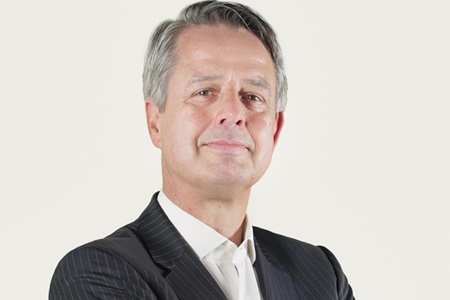
Tell us a bit about yourself
My background has been in the telecom and tech industry, and I have worked and lived in Europe, Asia, Australia, and now, the Middle East. During my executive career, my roles have mostly focused on delivering growth while navigating complex international environments. In my previous position, I was CEO of EXA Infrastructure, a pan-European and trans-Atlantic data centre connectivity provider. Leading up to that role, I was a senior advisor to I Squared Capital, a large global digital infrastructure investor, and for them I led the acquisition of EXA. Before that, I was the Group Managing Director of Telstra Enterprise and served on the Executive Committee of Telstra Corporation. During my time there, I was also CEO of Telstra Global, based out of Hong Kong, where it transformed under my leadership into the leading connectivity service provider in the Asia Pacific.
Can you outline your vision for Neo Space Group and how perhaps, it is different from other related entities such as the Saudi Space Agency and the Saudi Space Commission?
Neo Space Group aims to be the national champion for all commercial satellite and space activities in Saudi Arabia, while also emerging as a global leader in satellite technology and connectivity. Our mission aligns with Vision 2030 by driving innovation, diversifying the economy, and positioning Saudi Arabia as a key player in the global space economy.
While we collaborate closely with the Saudi Space Agency (SSA) and the Communications, Space and Technology Commission (CST), each has distinct roles. The SSA focuses on space activities that are not yet commercially viable, and CST handles regulations and international representation. In contrast, NSG is focused on the commercial space sector, delivering solutions across four key verticals: Satellite Communications, Satellite Navigation and IoT, Earth Observation, and satellite management services.
What are the short-term and long-term goals you hope to achieve for NSG and what are your immediate priorities as CEO?
In the short term, our focus is on translating our vision into a solid execution plan that delivers compelling outcomes for our customers. We’re building a worldclass team to drive this strategy forward and are keen to secure quick wins to demonstrate our ability to execute. A recent example is our successful bid for the Earth Observation wholesale platform license in Saudi Arabia, which has already sparked market interest.
For the long term, our goal is to establish NSG as a leading global satellite and space technology services company. We have a clear roadmap centred on four key areas: delivering integrated multi-orbit satellite communication services, advancing Earth observation and remote sensing with robust analytics, developing a world-class navigation and narrowband IoT offering, and launching a space-focused venture capital fund to invest in startups and localize activities within Saudi Arabia.
Given your experience with Telstra and EXA Infrastructure, what opportunities do you see for NSG to disrupt the global space industry?
We have three distinct advantages compared to more established space industry companies. As a new company, we operate from a fresh and open-minded perspective that is not saddled by legacy problems such as declining broadcast revenues or a high debt burden. Furthermore, we clearly understand which space sector areas we should focus on that provide us with the best opportunities to succeed. Thirdly, these factors are all underpinned by the fact that we have the backing of a strong, visionary investor in PIF.
This allows us to build on solid foundations and disrupt the current market status quo in several key areas. We will provide effective communication solutions by merging multi-orbit satellite technology with ground networks when necessary. This is further bolstered by our incorporation of established telecom technologies such as software-defined networking and multi-cloud access platforms. To enhance the geospatial ecosystem, we will have a dedicated platform for data processing and management, which is coupled with highly automated analytics that deliver more impactful real-time customer insights. We will also likely invest in satellites and constellations to meet future regional and global capacity needs. And finally, we use venture capital to support the development of new technologies that can be utilised across different sections of NSG.

What strategies/initiatives are you looking to implement to build partnerships with international space agencies and companies? Does NSG currently have partnerships in place?
We’re leading the development of a larger ecosystem through strategic partnerships that enhance our service offerings and market reach. For example, our collaboration with SES on the Open-Orbits platform allows us to provide high-bandwidth solutions to airlines. We’re also launching the Earth Observation wholesaler platform I mentioned before in Q1 2025 with a key partner, though we can’t disclose who just yet. Additionally, we’re exploring investments in satellites and constellations with established players to better serve regional and industry verticals. These partnerships, including our work with SES and Display Interactive, are crucial for helping us grow faster and innovate within the space industry.
With connectivity and communications being a high priority for many satellite/ space entities now, how are some of the newer satellite trends (LEO, MEO, software-based satellites, 3D printed satellites) changing the game?
The game is changing fast with two main drivers: cheaper space access and cutting-edge digital technologies. These advances are delivering better user experiences at lower costs and enabling more than just basic connectivity. The space industry is catching up to terrestrial communications, where software-defined networks seamlessly connect people and machines across multiple cloud environments. Soon, satellite-based services will integrate into these networks, allowing for uninterrupted information flow, no matter where you are.
New global standards like 3GPP non-terrestrial networks are also making it easier to mix different networks, while digital phased arrays are replacing traditional antenna dishes, ensuring constant connectivity in vehicles like cars, buses, and ferries.
“The game is changing fast with two main drivers: cheaper space access and cutting-edge digital technologies” – Martijn Blanken, CEO, Neo Space Group
Handheld devices are becoming satellite terminals, enhancing safety, remote education, and telemedicine. At Neo Space Group, we’re boosting network agility and flexibility, using regional Large Language Models (LLMs) for smarter local management. These innovations are making space-based connectivity more accessible and opening new opportunities in the global space economy.
Would AI have an important role to play at NSG just yet?
Absolutely, AI is integral to all business verticals at NSG, with its most active role in our Earth Observation and Geospatial segments. We’ve recently secured the permit to operate the geospatial marketplace platform for the Kingdom and are now rolling out the platform. This powerful technology can manage geospatial data from all sensor types, including space, aerial, and ground.
How do you plan to leverage the investment from the Public Investment Fund (PIF) to expand Neo Space Group’s capabilities and market presence?
PIF, our shareholder, has committed capital to drive our strategy forward. Simply put, this investment empowers NSG to expand globally. We’re focusing on three growth paths: building, partnering, and acquiring. With PIF’s backing, we’re poised for significant growth, enabling us to enter new markets and enhance our connectivity solutions. We’re proud of our Saudi roots and the strong support from PIF, and we’re committed to delivering value through innovation and excellence in the global space economy.
Can you discuss the venture capital fund aspect of Neo Space Group and its role in supporting space-related startups?
Like any VC, we focus on growing companies by providing investment, generating business by being a customer, and offering mentorship and access to our network. NSG’s VC fund is designed to support innovative local space-related startups. We are in the early stages, actively identifying promising startups to support. Beyond funding, we’re committed to being a main driver of the Saudi space economy alongside SSA, KACST, Aramco, and others. Our initiatives will also develop local talent and expertise, as Saudi Arabia becomes a hub for innovation and global collaborations in the space industry.












Add Comment